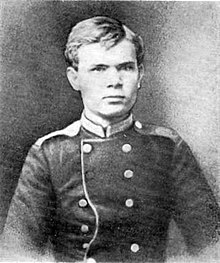Zygmunt Mineyko
Zygmunt Mineyko (* May 11. . Jul / 23. May 1840 greg. Gut Bałwaniszki at Oschmjany , Vilna Governorate , Russian Empire ; † 27. December 1925 in Athens ) was a Polish-Greek engineer, politician and amateur archaeologist .
Zygmunt Mineyko came from a patriotic Polish family who lived in Lithuania. He studied engineering at the University of St. Petersburg , but had to finish his studies due to anti-state propaganda against the tsar . In 1863 he was arrested as the leader of the failed armed anti-Russian uprising in the forests of Lithuania in January and sentenced to death. The sentence was commuted to 12 years in Siberia , from where he escaped to France. There he continued his studies at the École d'application d'État-major and graduated in 1868. He went to the Ottoman Empire , where he worked for 20 years in the regions of Bulgaria , Thrace , Epirus and Thessaly in road, bridge and rail construction. In addition, since the mid-1870s, he dealt with archeology , especially in the region around Ioannina . Since 1875 he has been digging in Dodona with Konstantinos Karapanos . Karapanos later tried to downplay Mineyko's achievements and mentioned him only once in his two-volume work Dodone et ses ruines , which was written without Mineyko . Most of the finds he made in Dodona ended up in the Berlin Collection of Antiquities . He also made an ethnological map for the Epirus region.
In 1880 Mineyko married the daughter of the high school director of Ioannina, Prozerpina Manarys. The couple had two sons, Stanislaus and Casimir, and five daughters, Andromacha, Hedwig, Sophia, Cecily and Aldona-Sapho. Although he only seldom stayed in Poland since 1863, the connection to Poland was never broken. He wrote for several Polish newspapers and magazines, including about the Olympic Games in Athens in 1896 . He always took a pro-Greek point of view, just as he had always taken a pro-Polish point of view. He recognized similarities between the two peoples who had long been under foreign control and who were looking for their way to independence. In 1891 he decided to stay permanently in Greece and worked for the Greek Ministry of Labor. In 1896 he was appointed to a committee for Crete , and since 1897 he has headed the topographical section of the Greek General Staff. In 1910 he was made an honorary citizen of Greece. Since that time he also supported Eleftherios Venizelos ' policies. During the Balkan Wars of 1912/13, the Greeks succeeded in conquering the region of Epirus, which was still occupied by the Ottoman Empire, with its center Ioannina. For this he was awarded the Golden Cross of Merit. During the First World War Mineyko was an opponent of the pro-German position of King Constantine I , he favored the Entente powers for national-Greek reasons . Even later, until his death, he stood in opposition to the king, for whom he could hardly find a good word in the diary he wrote in the last ten years of his life. The defeat in the war against Turkey made him depressed towards the end of his life . During a visit to Poland in 1922 and 1923 Mineyko received many honors, especially military ones. He was awarded the honorary rank of colonel and the Order of Virtuti Militari . The University of Lwów awarded him an honorary doctorate . His daughter Sofia Mineyko was married to Georgios Papandreou and was the mother of Andreas Papandreou and the grandmother of Giorgos A. Papandreou .
Web links
Individual evidence
- ↑ Jan Ciechanowicz: Rody rycerskie Wielkiego Księstwa Litewskiego Volume 2 (A – D), Fosze Verlag, Rzeszów 2001, ISBN 83-87602-82-5 , p. 190.
- ↑ Olga Hirsch-Dyczek: Zygmunt Mineyko et le centenaire de la découverte de Dodone . Travaux du Center d Archeologie Méditeranéenne de VAcadémie Polonais des Sciences, 26, Etudes et Travaux, xiii, 1983, p. 128.
- ^ Mineyko Zygmunt. ( Memento of the original from February 1, 2014 in the Internet Archive ) Info: The archive link was inserted automatically and has not yet been checked. Please check the original and archive link according to the instructions and then remove this notice. [In:] Inżynierowie polscy XIX i XX wieku: 100 najwybitniejszych polskich twórców techniki , pp. 160–163
| personal data | |
|---|---|
| SURNAME | Mineyko, Zygmunt |
| BRIEF DESCRIPTION | Polish-Greek engineer, politician and amateur archaeologist |
| DATE OF BIRTH | May 23, 1840 |
| PLACE OF BIRTH | near Oschmjany , Vilnius Governorate , Russian Empire |
| DATE OF DEATH | December 27, 1925 |
| Place of death | Athens |
